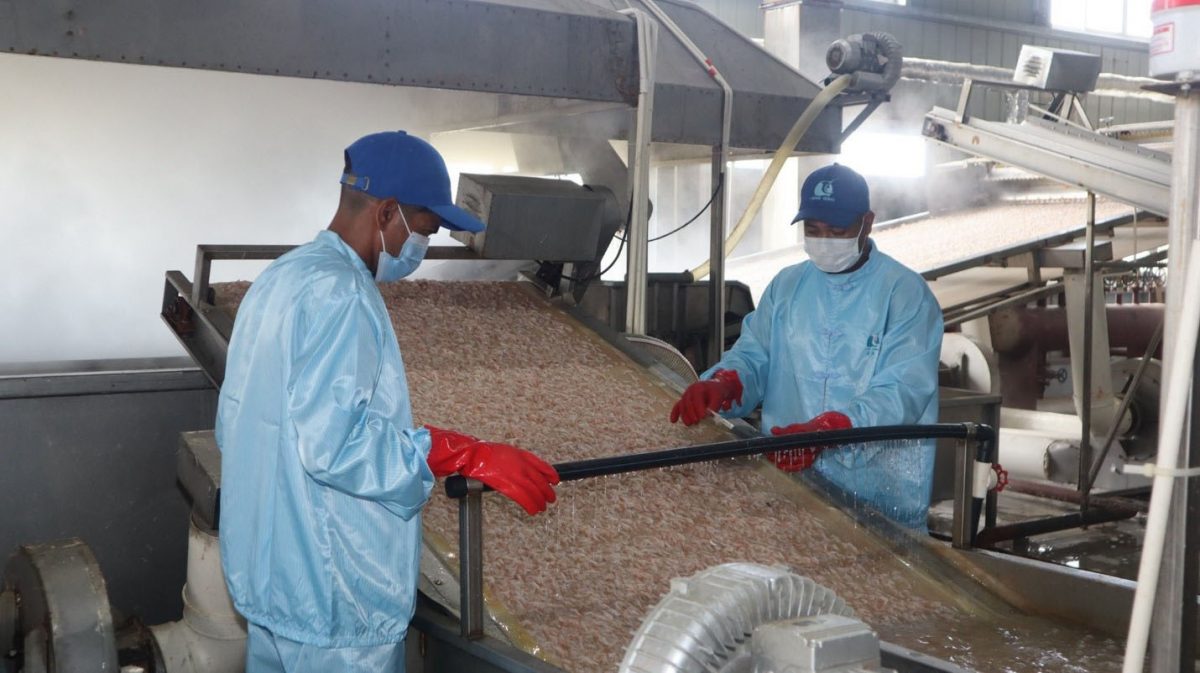The opening of a huge Chinese-owned seafood plant in Guyana has added to concerns that sustainable fishing here, particularly in relation to the seabob, could be threatened.
According to the Minis-try of Agriculture, Chinese company, Grandeast Inc has invested US$25m in a plant which is already processing large amounts of shrimp.
While it is not clear what “large amounts” equates to, Stabroek News understands that the plant has a yearly processing capacity of 3,000 tonnes.
Grandeast Inc. a wholly-owned subsidiary of Fuz-hou Hongpu Aquatic Pro-ducts Co., Ltd. in Fujian, China, a company specialising in “processing and trading of fishery products” has so far employed 240 persons.
General Manager Wu Junyu has said that this was the first phase of the company’s local operations and that plans are being broached for the commencement of phases two and three.
Junyu also said that with the company looking to expand, it will require more produce from local fishermen in order to supply its Asian market.
Attempts by Stabroek News to get a clear idea of what these two phases will include and the overall shrimp processing capacity have so far proved futile.
Minister of Agriculture, Zulfikar Mustapha directed questions on the matter to the ministry’s public relations officer who suggested that Chief Fisheries Officer Denzil Roberts might be best suited to respond to queries. Roberts however did not have the information on hand and has promised to supply same today.
So far, according to the Ministry, the plant is supplied by the fisher folk of West Demerara with plans to reach out to those from Berbice.
The plant’s opening followed a controversial approval of two trawler licences for the Atlantic seabob trade.
In December, the World Wildlife Fund (WWF) wrote Mustapha expressing concern that the approval of the licences could lead to overfishing, the loss of trade certification and collapse of the industry.
The WWF Guianas’ local office wrote to the minister seeking clarification on the context in which the licences were granted.
“…We would be grateful if you can provide any information you may have in relation to this matter,” Aiesha Williams, Guyana Country Manager for the WWF Guianas, wrote in the December 11th letter, saying there was need to better understand the context in which the licences were issued.
Williams also expressed concern over the reported issuance of the new licences in a manner that could have “deep implications” for the country’s ability to maintain its Maritime Stewardship Council (MSC) certification over seabob.
With the sector being regularised to operate in a sustainable manner, there is fear that the two new licences for operations will encourage practices that undermine conservation and sustainability efforts.
Williams pointed out that with Guyana listed by the Food and Agriculture Organization (FAO) as the largest seabob exporter globally, it is already under international scrutiny over how it manages this fishery resource. The seabob fishery is the country’s only certified fishery sector and the WWF, which has been working with the fisheries sector for several years, assisted the industry in obtaining its MSC certification.
In her letter, she informed the minister that a recent stock assessment of Guyana’s seabob population revealed that it is fully exploited and it is at the point where the population curve is at the maximum sustainable yield.
“Any further increase in fishing effort will lead to overfishing and possible collapse of the industry, since the removal of individuals (seabob) is equal to the number of recruits (offspring) entering the fishery (deaths = births), from a fisheries management context,” she explained.
In response Mustapha said that despite his ministry’s granting of the approval of the licences for the operation of new trawlers, it does not go against the agreement in place with the Guyana Association of Trawler Owners and Seafood Processors (GATOSP) and international partners.
He justified the approval by explaining that several licences are inactive and the current number of trawlers operating does not exceed 80.
Aside from the seabob and shrimp, observers have expressed concern that a range of species could be sold to the Chinese company, expanding fishing in local waters that have already had questions raised about fish stocks. Further, there is likely to be a follow-on impact on the local fish market with higher prices likely.







